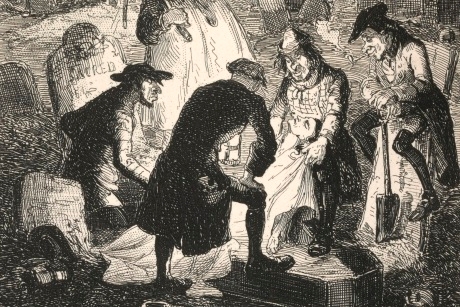…But then,
All crib from skulls and bones who push the pen.
Readers crave bodies. We’re the resurrection men.
— George Macbeth, The Cleaver Garden
Resurrection men made their living providing dead bodies to surgeons and medical schools, generally for dissection, but also for collection and experimentation. It was always a distasteful job in the public’s eyes. Legitimate resurrection men had business relationships with hangmen, and in other cases were able to claim unclaimed bodies. Illegitimate resurrection men would steal from graves and, for those of a more actively entrepreneurial spirit, would shorten the chain of title and kill people outright before selling the bodies. (Burke and Hare are the most famous of the infamous resurrentioners.)

Mantel borrows some of that macabre tone in the epigraph she chooses for The Giant O’Brien. Writers, too, in a sense, are Resurrection Men. They dig up bodies and sell those bodies to us, the reader, in books. George Macbeth’s line, readers crave bodies, has a doubling effect to it: not only to readers want to read about people, a not insignificant number of people want to read about crime and grime and murder and death. We want to read about people; and we want to read about their deaths. (I’m being pretty careless with the word “we” and you may be saying, “But I don’t want to read about dead bodies!” and of course, beloved, I believe you; it’s only generalities I’m dealing in at this point.)
Mantel aligns herself with the resurrectionists; she leaves it up to us to decide what we are in this drama.
Our two protagonists share some similarities:
- They’re both outsiders to London — the giant, O’Brien, is Irish; Hunter, the surgeon, is Scottish. England has never thought much of, or well of, Ireland; and Scotland had just suffered a defeat at English hands in the years leading up to our novel. Both are outsiders, but that doesn’t lead to any unity between them.
- They’re both self-taught. O’Brien is a skilled storyteller with an empath’s ability to soothe a situation. Hunter, as most men of science in the Age of Enlightenment, has taught himself anatomy and physiology. He has an enthusiast’s interest in taking things apart to wonder at how it all works.
- They’re both dying.
It’s the tension in their differences, though, that drives the book. O’Brien wants to earn a living and a better life away from Ireland, which has been ravished by English imperialism. He also, while recognizing the appeal of his extraordinary height, wants the same human dignity afforded to the typically-sized and typically-abled. Hunter sees a living in the death of O’Brien: he can dismantle the giant into workable pieces, and assemble it again for display and posterity.

Mantel has a bias; she’s a writer interested in challenging orthodox thinking. It’s called the Age of Enlightenment, which has a pleasant ring to it. But Mantel shows us Hunter, at a young age, pulling apart a bug just to see what will happen. The narrator tells us it wasn’t with malice — and I can’t decide if that’s better or worse. It’s ironic that, scientifically, he’s very much interested in cause and effect; however, on the human/empathic level, he shows no facility or interest at all. Emotions stand in the way of his pursuits, distractions from his goal of collecting and understanding.
Is Hunter’s pursuit of the giant, O’Brien, cruel? Is his enthusiasm for O’Brien’s body a hastening agent for O’Brien’s death? We know O’Brien, like the rest of us, will die eventually; is there any consideration, at all, as to O’Brien’s wishes once he passes? Mantel’s book examines the tension between science and morality, between curiosity and cruelty.
When O’Brien dies, he leaves behind a rich oral tradition of faerie stories and folk tales. He also leaves behind a skeleton much prized by Hunter. Hunter, on the other hand, seems little interested in passing on any sort of learning. He collects knowledge as he collects specimens, but to what point? That’s a question this rich novel invites us to consider, and answer.

